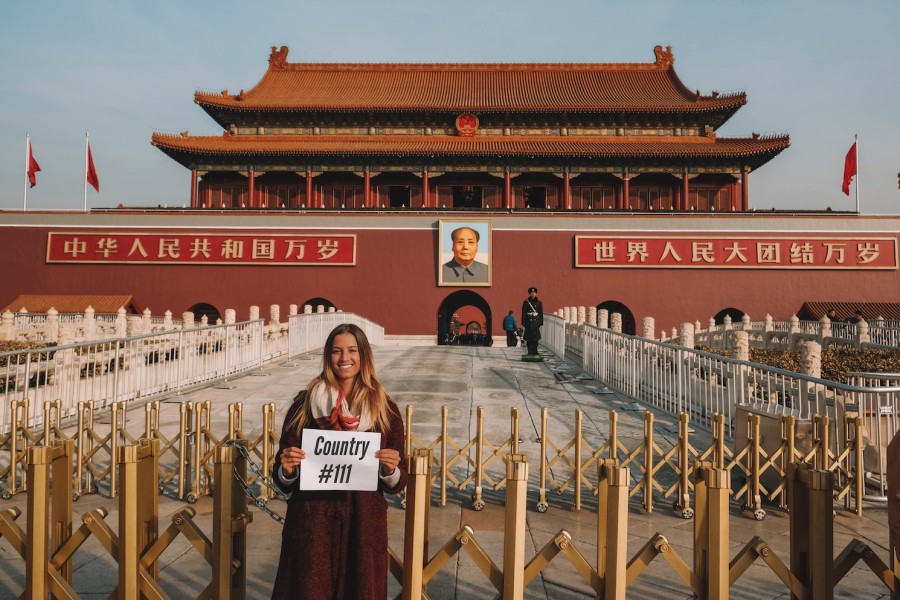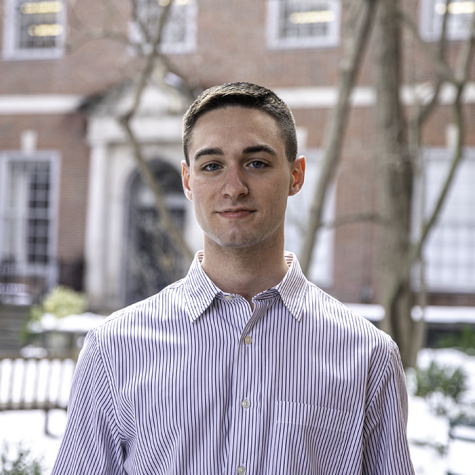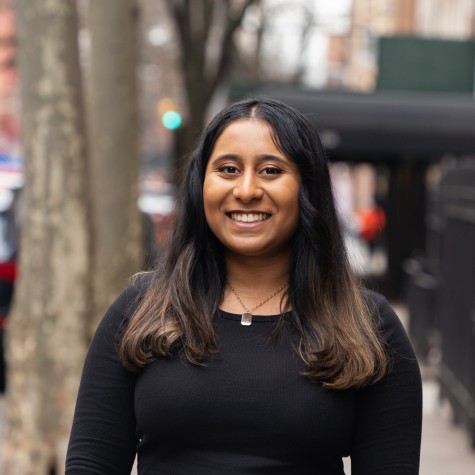Q&A: Guinness World Record holder Lexie Alford on traveling to every country
After studying away, we thought we were expert solo travelers — until we sat down with the youngest person ever to visit every single country.
Lexie Alford visited China as part of her attempt to visit all sovereign countries in the world. (Image courtesy of Lexie Alford)
May 6, 2022
Last semester, we studied away at NYU Abu Dhabi and NYU London, where we fully immersed ourselves in the local cultures. Over 40% of NYU students study away for at least one 16-week semester — twice as long as most U.S. students. During our mid-semester travels from Oman to Poland, we took advice from YouTuber and content creator Lexie Alford, the Guinness World Record holder for being the youngest person at 21 to travel to all 197 sovereign countries.
According to Alford, traveling differs from tourism in that it emphasizes making connections with locals to broaden your understanding of their culture, history and struggles more deeply than in classrooms or capital cities. After graduating early from high school and receiving her associate’s degree at the age of 18, Alford, who already had roughly 70 countries stamped in her American passport, began backpacking through Europe during a gap year. Like many NYU students who study away to expand their global insights and challenge their comfort zones, Alford didn’t know what she wanted to do with her life. Once she realized her passion was widening her perspectives through travel and experiencing other cultures, Alford knew she would regret it for the rest of her life if she didn’t try to break the world record.
Right before spring break, we decided to email Alford on a whim. To our surprise and excitement, we ended up sitting down with her over Zoom. With summer trips approaching and NYU’s global sites set to re-open by July, Alford spoke to us about her travel tips, advice for college students and future plans from sunny Venice Beach, California.
This interview has been edited for length and clarity.
WSN: Many NYU students come directly from New York or nearby states and have little to no travel experience. What advice would you give to students traveling abroad for the first time in their lives about how to mitigate that initial fear and anxiety?
Lexie Alford: Using social media to meet locals quickly is always a great idea. Being able to post something that says, “Hey, I’m coming to New York City, is there anyone that’s following me or knows mutual friends there?” The more research and planning you do before you even arrive at a destination, the more smooth your trip is going to go. It’s very fun to actually get excited during the research phase of your travels — to find out what are the best places to go to, what bucket list things do I want to do while I’m there, and start having a plan and a strategy for being able to do all those things.
WSN: What was it actually like for you when you traveled abroad for the first time? Was it a natural, I-was-born-for-this kind of feeling, or did you feel nervous or scared?
LA: I had been traveling with my family since before I could remember, so I grew up with some exposure to a lot of different cultures. The most intimidating part is just the act of getting started. Once you get there, you realize that there’s so many kind people and you start to feel more self-confidence and independence in your own abilities to be able to navigate different situations in different landscapes.
WSN: As a woman, what are some difficulties that you’ve faced in your travels? How do you judge your surroundings and what safety tips would you give to college students?
LA: My two golden rules are not going out alone at night and not getting intoxicated. Don’t do drugs or anything that gets you out of control of your environment. Depending on the culture that you’re traveling in, erring on the side of modesty helps a lot. You want to blend in as much as possible when you’re a traveler; you don’t want to stick out as a super obvious tourist. Women can get a lot of unwanted attention depending on what they’re wearing; unfortunately, that’s still the world that we live in. As a woman, sexual harassment while traveling was definitely one of the biggest challenges. Being conscious of what you’re wearing and how much attention that could get you is a big one.
I share my itinerary, flights and ways to contact me with a friend or family members, both for my own peace of mind to know that, even though I’m alone in a new place, someone still knows where I am. It also actually gives families a lot of peace of mind, because I know one thing that stops a lot of young people from traveling to unique places is that their family is so afraid of them going somewhere.
You really don’t need a lot of material possessions to travel at all — I take a bit of a minimalist approach to what I’m bringing with me. Most places in the world can be done with a backpacker budget of roughly $50 a day. You’re going to be sacrificing some comforts that you would have at home, but I know most young people would prefer to rough it and have experiences than not go at all.
WSN: Especially for students studying away during the regular semester, time management is something we think about pretty often. What are your tips for working and squeezing in trips while traveling?
LA: A part of the safety tip where I said it’s not great to go out at night actually doubles as a perfect time — once the sun sets, that’s when office time starts. Being able to study or do your homework in a beautiful cafe somewhere in Spain is going to be way more fun than just sitting in your dorm room doing it. You’ve got to be a weekend warrior when you’re in school, so making a long list of all of the places that are in the radius of things you could do — in a two- or three-day stint possibly — or maybe even an overnight mission, wake up in a new, beautiful place, and then come back the following day. But you gotta just squeeze in all of the life that you can while you’re young and traveling.
WSN: Many NYU students take full advantage of our global sites before starting their full-time careers. What life lessons do you believe solo traveling can give college students?
LA: I would recommend to all NYU students: if they can, take those study abroad experiences. Having travel experience does make you stand out a lot on your resume and in interviews. Having any experience — speaking other languages or demonstrating that you have the common sense and street smarts to navigate different countries — eventually affects the way that you can communicate and understand global issues. Being able to connect and bond over shared travel experiences is an amazing conversation starter.
WSN: As a traveler, how do you recommend engaging with local culture in a way that is authentic and respectful?
LA: I always recommend knowing a few words in a local language and just walking around with an open mind and an open heart. I swear, when you have the intention while traveling to go out and meet new people, just having that energy and openness about you will attract people to you as well, but you also gotta put yourself out there and just start having conversations. Just being able to keep that perspective that you’re a guest and everyone should be treated with respect regardless of where you are.
WSN: What has traveling taught you about language barriers and the different backgrounds we all grow up in? Do you almost feel an instant connection with anyone you meet because you can talk about shared experiences?
LA: I remember getting into a taxi in New York, and the driver was from Benin, and we started talking about his home country and he was just absolutely shocked that I even knew on a map where that was, let alone had been there myself. It’s always an amazing way to connect with people even after you’ve finished with your travels, because you know people abroad especially miss home and being able to talk about home is a really special experience. Humans are 99% the same everywhere you go — we all have the same basic needs, we all want to be happy and have security and safety in our lives, to have good friends, love our family — those fundamental human traits are universal. But I would say that it’s our differences in culture that actually make travel and the world such a beautiful place. All of our differences are what should be celebrated, because if every culture was exactly the same that would be incredibly boring.
WSN: Do you ever feel alienated coming back to the United States after having such global experiences? Is it too cliche to consider yourself a citizen of the world?
LA: It’s definitely cliche, but I do consider myself a citizen of the world. When I come back to the United States after a long time, especially traveling in cultures that are vastly different than it is here, I almost have reverse culture shock where you start looking at the elements of your own home through the eyes of a traveler. With all of the different influences and experiences I’ve had, being able to bring that home, share that with my community here, and have more gratitude for what we have here is an amazing takeaway.
• • •
“Every video I have from my first travels is worth its weight in gold,” Alford said. “Being able to capture yourself at this age and the people that you’re traveling with will become the best memories to look back on later on.” In addition to immortalizing the moment for herself, Alford shares her experiences publicly to inspire others. Since breaking the Guinness World Record three years ago, Alford has been writing a book on her experiences in every country and how they’ve shaped her outlook on life. As of now, her biggest travel bucket list item is going to Antarctica — the one continent she has yet to set foot in. Although she hasn’t yet visited all 50 states, there’s nothing stopping Lexie Limitless from covering the map.
Contact Anthony Ferrara at [email protected] and Roshni Raj at [email protected].





























































































































































